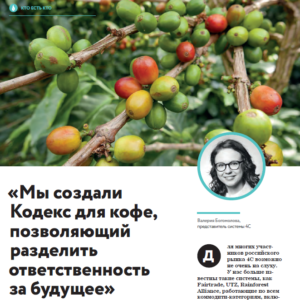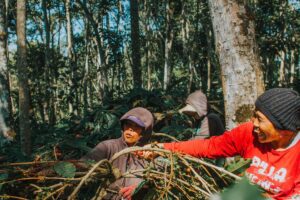Sharing Responsibility for Coffee of the Future: 4C Talked to “Coffee and Tea in Russia”
4C talked to “Coffee and Tea in Russia” and shared some insights into the 4C standard, its history, and how 4C works towards more sustainability in the coffee sector.
 Being one of the global leading systems for certification of sustainable coffee cultivation and processing, 4C plans to strengthen the involvement of market participants in protecting nature, strengthening labor rights, and supporting stable incomes. In her interview for “Tea and Coffee Magazine in Russia”, Valeriia Bogomolova talks about how 4C works and what benefits it creates.
Being one of the global leading systems for certification of sustainable coffee cultivation and processing, 4C plans to strengthen the involvement of market participants in protecting nature, strengthening labor rights, and supporting stable incomes. In her interview for “Tea and Coffee Magazine in Russia”, Valeriia Bogomolova talks about how 4C works and what benefits it creates.
For many participants in the Russian market, 4C may not be very familiar. We have heard of such systems as Fairtrade, UTZ, and Rainforest Alliance, which work in all commodity categories, including coffee. Can you tell us where 4C started?
The Common Code of Coffee Community (4C) was created as a result of extensive multi-stakeholder consultations of global coffee business participants back in 2003-2006. First, it was launched in a form of the 4C Association, declaring the need to introduce basic values into coffee production that would help preserve nature and spread sustainability along the entire chain. The 4C Association worked on several different sustainability topics. One of the key things was the creation of a traceable and independent verification system for coffee which represented the principles stated in the Code of Conduct. The logical outcome of this work was the eventual transformation of the 4C Association in 2015-2016: the 4C Code was operated by Coffee Assurance Services (CAS) while other pre-competitive activities were handed over to the Global Coffee Platform (GCP). In 2018, CAS was acquired by MEO Carbon Solutions and transformed into an independent 4C certification system, operated by 4C Services GmbH.
How does 4C differ from other certification systems?
First of all, we focus exclusively on coffee. This allows us to look deeper into the problems of the coffee industry and quickly find better solutions to meet our stated goals. Furthermore, one of the main environmental criteria for us is the protection of primary forests and areas of high biodiversity. In addition to environmental and social principles, we also put stress on farmers’ economic viability, including principles of business management, capacity development, access to services and market information, and traceability.
Let’s understand how it works. Why does a farmer need this certification?
Participation in our system is a classic win-win situation. Coffee producers are certainly interested in increasing their income and develop their business more sustainably across three well-known dimensions. We make it possible with the help of the criteria laid down in the 4C Code of Conduct, which addresses a large variety of sustainability challenges. That is, coffee certified by 4C, as a rule, costs more than alternatives. The certification procedure itself is not complicated. Any producer can apply for 4C certification and certify their farm in compliance with strict sustainability criteria of the 4C Code of Conduct. Independent auditors conduct on-site audits and evaluations to conclude with issuing a certificate or not. The cost of participating in the 4C certification system for the farmer comes down to the audit price negotiated between the farmers or their cooperative and the independent auditors. For example, in Ethiopia, the cost of the initial audit of one farmer can be 3,200 Euro, but in Brazil, it will be some other price. But I want to point out that this is the amount that the farmer pays to the auditing company, not to us.

Is it that simple?
Obsivously, not everyone who comes to us initially meets the criteria of compliance Level 2 or Level 3+. That is why we have a system of continuous improvement plans, through which farmers increase their sustainability performance step by step. We are constantly monitoring the development and, thus, encourage coffee producers to improve their farm management methods and take care of people and the environment, which results in a more sustainable and profitable business and increased farmer confidence in the future.
You mentioned that you charge no certification fee. How are your operations financed in this case?
We receive payments from companies that source 4C certified coffee. There is a calculation formula, which is tied to physical volume. We keep a record of all the coffee that passes through our system, which ensures high traceability of 4C certified coffee beans.

So 4C gets its funds from traders and roasters?
Not exactly. 4C gets the financial means from the roasters, coffee brand owners, retailers, etc. Traders only have to be registered on our platform and regularly enter data on 4C coffee purchases to improve supply chain traceability. 4C’s uses its revenue primarily to improve the standard and support farmers through projects on the ground and only partially for marketing and advertising. The companies sourcing 4C certified coffee thereby contribute to a common cause and spread sustainable coffee which is grown following high standards. This is important for them because in many economically developed countries consumers are paying more and more attention not only to the quality of the product but also to the environmental and social responsibility of all those involved in its production chain. The 4C logo appears on the packaging of the finished product, and consumers can see what they support with their small contribution when they buy such a product. So, in a sense, for the image of many market operators who sell the finished product, working with such coffee is gradually becoming something of a must-have.
What is the reach of the 4Cs today? How many countries do your certified farmers work in?
We work in 23 countries. But to give you a better idea, let me give you some other figures. There are nearly 400,000 farmers around the world growing 4C certified coffee working on over 850 hectares of land. And most importantly, it’s more than 26.6 million bags of coffee a year, which is about 15-20% of world consumption.[1] Now we are actively working on increasing recognition of 4C on the consumer markets, especially the developing markets. We have corresponding programs, and we hope that Russian consumers will also soon become part of the supply chain of organic coffee, which has a high social responsibility.
You can find out more about how 4C works and what benefits the coffee sector can get by visiting the organization’s stand in the Coffee Tea Cacao Russian Expo virtual pavilion from March 11.
[1] The figures refer to the year 2019. Click here to see the latest information.
This article was originally published in Russian. To read the original version, please follow the link.